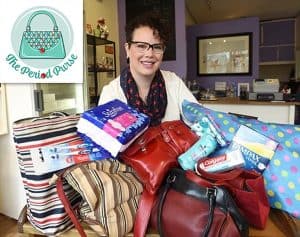College Voices
Why Policy Is the Lifeblood of Period Activism
Poverty prevents 25 million women in the U.S. from having consistent access to period products.
Yet menstruation is in no way optional for women and certain non-binary and transgender individuals.
Menstrual products are therefore not a luxury but a necessity. In response, drives for homeless shelters often ask for donations of pads and tampons to give women safe, dignified periods. There has also been a rise in nonprofit organizations dedicated to providing people with access to period products.
Though these philanthropic efforts can serve entire communities, they fall short of solving the broader systemic issue of inaccessibility.
Consequently, menstrual activism has largely shifted towards addressing these inequities through the form of policy changes.
The most salient fight now in America under the guise of policy is the removal of sales tax on pads and tampons. While several states have successfully passed legislation to abolish the tax, 36 states still tax menstrual products.
In America, this campaign was spearheaded by Jennifer Weiss-Wolf. In 2015, she encountered a food pantry asking for donations of menstrual products.

Source: Jennifer Weiss-Wolf
As a lawyer with a background in advocacy, she was shocked by this reality that she hadn’t considered before. Inspired by the drive and the lack of discourse on poverty and menstrual health in America, she began writing essays.
Eventually, she coined the term menstrual equity, which refers to the availability of menstrual products for everyone who needs them. The term has caught on among period activists to represent a human rights movement, but Weiss-Wolf cautions against this definition.
“The idea of menstrual equity narrowly was always intended to be a policy frame and a way to bring policy makers and legislators on board,” Weiss-Wolf said.
“It was very explicit about not using language related to rights or even health, which evokes different responses in legislators.” It’s a careful logic that Weiss-Wolf applies in her appeals for policy changes, as to give it the best chance to pass.
Pushing the tampon tax legislation in America is a gateway to begin considering menstruation within policy. “If we could get legislators talking about it and willing to introduce it, it would really open up the door to talk about the economics of menstruation,” she said.
Laws, as a reflection of society, must be changed to adequately capture the economics of being a woman.
“When you codify something into law, by definition, you’re normalizing it and creating accessibility for everybody.
It’s the answer to the entire structural revolution that we need to have,” she said.
Similar to Weiss-Wolf, activists are working within the framework of local policy much more often. Amanda Laird, host of the podcast The Heavy Flow, recounted her experience in talking to Toronto city councilors.
Along with a friend who runs The Period Purse, an organization that donates menstrual products directly to shelters and the homeless in Ontario, she talked to city councilor Kristyn Wong-Tam. “She is an incredible, progressive force of nature,” Laird said of Wong-Tam.
As a result of their conversation, Wong-Tam drafted a proclamation for Menstrual Hygiene Day in the city of Toronto. In addition, Wong-Tam, taking after New York City’s measures to provide free products in schools, jails, prisons and homeless shelters, brought a motion to city council to earmark 2 million dollars in the 2019 budget for menstrual supplies for marginalized individuals.
If passed, free menstrual products would be provided to shelters, drop-in centers, and wherever these people can access them. As of June 28, 2018, Wong-Tam’s motion passed 30-1.
It’s incredible to witness progress towards menstrual equity through policy at the hands of legislators influenced by activism. Repealing the tampon tax is one step, and providing free products for those in need is the next.
As Weiss-Wolf said, “It is beholden on us to look at every single law and ask if this considers the reality of people who menstruate. And if it doesn’t, how could it do better?”


